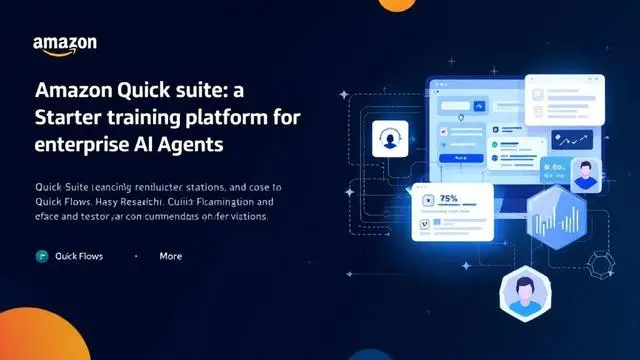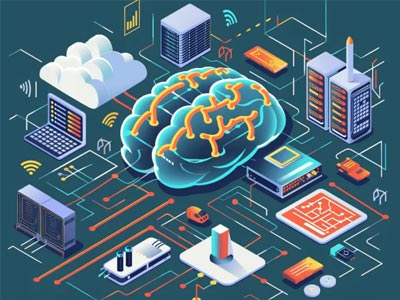Despite continued concerns among businesses about the accuracy, reliability, and trustworthiness of AI, Amazon believes that by making it easier for ordinary employees to build agents, they will soon be able to automate the mundane aspects of their work.

On Thursday (October 9), the company founded by Jeff Bezos released a new software platform called Quick Suite, designed to simplify the creation of AI agents and enterprise chatbots. These agents can retrieve information from a variety of internal and external data sources, visualize data, generate reports, and automate routine tasks.
The product is reminiscent of many agent-based AI workflow platforms, such as Google Gemini Enterprise (recently rebranded from AgentSpace) and n8n, offering a similar no-code environment for connecting internal documents, wikis, forums, intranets, and other data sources, and leveraging them to create agents capable of performing tasks like digesting emails, sending messages, or updating Jira tickets.
At launch, the software suite supports 50 popular enterprise platforms, such as Office 365, Slack, and SalesForce. Amazon says users can extend Quick Suite's functionality by using its MCP server, a technology we delved into earlier this year.
However, AWS isn't just making another drag-and-drop agent builder. The e-commerce giant also uses generative AI models to help users plan and create automated workflows in minutes, leveraging tools like large language models.
For example, Amazon's Quick Flows, designed to automate routine tasks, allows users to explain what they want to accomplish and what the desired outcome should look like. Meanwhile, Amazon's Quick Automate is similar in concept but designed to support more complex projects.
Many other components of the suite will be familiar to users of popular chatbot services like OpenAI's ChatGPT or Anthropic's Claude.
One of the more familiar features is Amazon's Quick Research tool, which we understand works like OpenAI's Deep Research but can be customized to pull data from enterprise platforms and databases in addition to the web.
Quick also includes data visualization capabilities, which Amazon says pulls information from various data sources and then creates charts and analyses on the user's behalf. This is similar to what Anthropic does with its Artifacts feature.
Building AI agents has never been easier, but can I trust them?
Amazon's latest platform may lower the barrier to entry for businesses looking to use AI to automate low-value tasks, streamline operations, and/or reduce their workforce, but challenges remain, particularly in the areas of trust and security.
A study published earlier this summer by Carnegie Mellon University and Salesforce found that AI agents had an error rate of approximately 70% for office tasks.
To inspire confidence in Quick Suite, Amazon employees have apparently been testing its various features internally. For example, the e-commerce giant is using Quick Automate to reconcile thousands of invoices and cross-reference them with internal data to forecast cash flow and conduct root cause analysis.
Amazon's Deputy General Counsel, Jessica Gibson, is apparently using Quick Research to help the e-commerce company's legal, public policy, and compliance departments investigate matters such as the impact of regulatory changes across regions.
Amazon may be willing to take the risk of an AI agent hallucinating data and inspiring someone to act accordingly—but many businesses are not. While the success rate of AI agents will undoubtedly improve over time, as businesses become more confident in their capabilities, the potential for unintended consequences also increases.
Roughly three-quarters of businesses surveyed in a recent Gartner report said they are piloting or deploying AI agents in some form. However, few are allowed to operate autonomously, for obvious reasons.
Even if generative AI isn't allowed to make decisions for itself, the risk of hallucinations remains a persistent concern, exacerbated by the highly publicized scandal earlier this year when a lawyer was found using ChatGPT to generate a series of non-existent legal cases.
Despite this, Gartner still sees value, predicting that by 2028, approximately 15% of daily workplace decisions will be made by AI agents.
Q&A
Q1: What is Amazon Quick Suite? What does it do?
A: Quick Suite is a software platform launched by Amazon designed to simplify the creation of AI agents and enterprise chatbots. It can retrieve information from internal and external data sources, visualize data, generate reports, and automate routine tasks. It supports 50 popular enterprise platforms such as Office 365, Slack, and SalesForce.
Q2: What is the accuracy rate of AI agents in enterprise office tasks?
A: According to research by Carnegie Mellon University and Salesforce, the error rate of AI agents in office tasks is approximately 70%. This is one of the main challenges enterprises face when deploying AI agents and is why few agents are allowed to operate fully autonomously.
Q3: What are the key tools included in Quick Suite?
A: Quick Suite includes multiple tools: Quick Flows for automating routine tasks, Quick Automate for more complex projects, Quick Research similar to OpenAI's Deep Research but with data from enterprise platforms, and data visualization for extracting information and creating charts for analysis.




